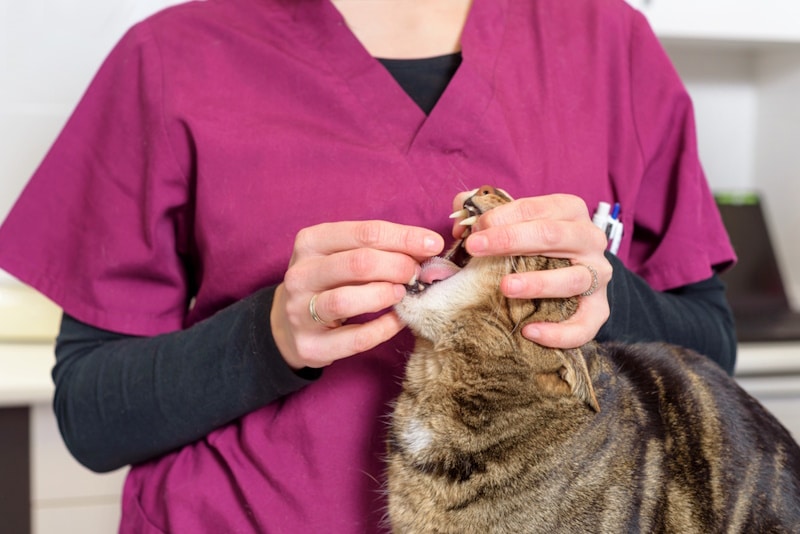Allergies in cats can have the same symptoms as ours – watery eyes and nose, mild congestion, and sometimes coughing. More often, allergies to cats manifest as itchy skin, redness, and/or swelling of the skin.
You may be familiar with the brand name Zyrtec. It’s a common over-the-counter (OTC) allergy medication that many of us take in the midst of pollen season. But can Zyrtec be given to your cat too? Yes, Zyrtec can be given to cats, but it is important to consult your veterinarian before giving Zyrtec to your cat. In this article, we’ll discuss what Zyrtec is, if and how you can give it to your cat, and potential side effects your cat may experience.


What is Zyrtec?
Zyrtec is the brand name for the drug Cetirizine HCL (Cetirizine Hydrochloride). Zyrtec is an antihistamine allergy medication. When your cat’s body reacts to an irritant and/or an allergen, the body will release histamine. It is a naturally occurring substance and can be released without problems. With allergies and/or an allergic reaction, excess histamine can cause itching, redness, and sometimes swelling. Antihistamines work by blocking histamine from attaching to certain cell receptors that cause the effects listed above. Zyrtec is in the class of antihistamines classified as an H-1 blocker.

How Is Zyrtec Given to Cats?
Zyrtec is given orally. If your veterinarian recommends that you give the OTC product, it will come as a tablet, chewable tablet, gelcap, or a liquid children’s formula. The gelcap is probably not recommended because of the dosage your cat needs. If your cat is difficult to medicate, your vet may also have a compounded medication. This means that the compounding pharmacy will make the drug in a different form than what is available OTC and may also make it flavored.
Zyrtec can be given to cats every 12–24 hours, or once to twice a day. It does not have to be given with food, although giving the medicine to the cat can be very difficult. Sometimes giving it in food can be easier because your cat can eat it more easily with a snack like tuna. Giving Zyrtec with or without food does not change its effectiveness.


Zyrtec Dosage for Cats
It is important that you know your cat’s current weight. Depending on your cat’s weight, the dosing for Cetirizine is 1 mg of Zyrtec per 1 kilogram of your cat’s body weight. Typically, this will be 2.5 mg to 5 mg in total. However, be sure to check with your vet as they may recommend a different dose.

What Happens If You Miss a Dose?
The best part is that there are no serious side effects if a dose is not given, or if your cat does not allow you to give them medicine. Zyrtec is not a drug that needs to be weaned to be effective for your cat.
It is worth noting that significant allergies in cats are usually not affected by OTC antihistamine products. In other words, you won’t notice any improvement in allergy symptoms if your cat has significant allergies. If you regularly give your cat the recommended dose of Zyrtec, and both you and your vet see no improvement in their allergy signs, it may not be working for them. At that time, you should discuss other options with your veterinarian.
Potential Effects of Zyrtec on Cats
In general, cats can be stubborn and dramatic when taking any medication. Zyrtec does not have any common side effects, but some cats will spit, drool, foam at the mouth, and be dramatic just because they are being treated.
Mild drowsiness is possible, especially in smaller cats, but is not always the case.
If your cat has underlying liver and/or kidney disease, your veterinarian may recommend a lower dose and/or less frequent dosing. This is because your cat may take longer to process the medication if they have existing conditions.


Frequently Asked Questions
Can I Give My Cat Zyrtec D?
No! This can be very harmful and possibly fatal for your cat. The “D” in the name stands for decongestion, and this formula contains the drug pseudoephedrine. Pseudoephedrine can be very harmful to dogs and cats, and can be fatal. Never give your cat or dog any medication containing pseudoephedrine unless specifically prescribed by your veterinarian.
Is Zyrtec effective?
Zyrtec can be effective for mild pruritus (itching) in your cat. However, for severe underlying allergies, OTC medications are often insufficient. Your cat may need a new diet, appropriate flea prevention, prescription allergy medications, or steroids to completely stop the itching.

Conclusion
Allergies to cats usually manifest as skin irritation. Over-the-counter antihistamines can sometimes help relieve some of the most common allergy symptoms. Zyrtec is one of the more common OTC medications that can be prescribed. It is in oral form and should be dosed based on your cat’s current weight and your veterinarian’s recommendations based on that weight.
Zyrtec is given as an oral medication in either pill or liquid form, or your veterinarian may have a compounding pharmacy that makes the medication in another form. Very few side effects other than occasional sleepiness. It is important that you never give your cat Zyrtec-D, and you know that any OTC antihistamine may not be effective. Always work with your veterinarian for their best recommendations.
Featured Image Credit: David J Garcia, Shutterstock


